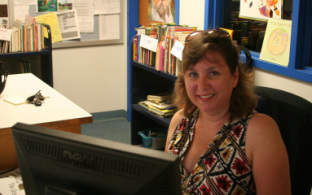3.4 Research and knowledge creation
Candidates use evidence-based, action research to collect data.
2010 ALA/AASL Standards for Initial Preparation of School Librarians
|
“Life can only be understood backwards; but it must be lived forwards.” – Soren Kierkegaard
I build relationships and I am reflective. Those two items have always been my strengths as a teacher, and I will carry these qualities over to forward in my role as a school library media specialist. In the School Library Action Research course, SLM 541, I learned how to conduct a formal action research project. This process relies heavily on reflective process. Within the course I developed a problem statement and research question, wrote a literature review, and produced data collection tools that would be used in the research. I studied the concept of Knowledge Building Centers, developed by David Loertscher, in which schools “build a collaborative learning space where adult coaches and students are building, constructing, and learning together.” |
 Photo by Stephanie Soldavini 2013
Photo by Stephanie Soldavini 2013
Just searching for a project was a reflective process in itself. This is the first time that I noticed I was thinking about and reflecting upon my graduate school learning most of my day. I began to notice many obstacles to learning that I would like to address. For example, I considered the (lack of) critical thinking that I was getting in student-written papers. What strategies could I implement to lessen this barrier to learning? I also observed the current school library media specialist closely. She was so busy completing her many roles; I wondered how she would find time to conduct research. The more I read for the evaluation assignment, the clearer it became that action research can be focused and incorporated into tasks the school library media specialist does anyway, and might be best used to try to make those tasks more efficient. I narrowed my observations into my problem statement: Reading, writing, critical thinking, problem solving, and knowledge building are skills emphasized in the new Common Core standards. Librarians are professionally trained to be leaders, facilitators, collaborators, and instructors on these skills. Content teachers may be uncertain of how to best implement knowledge building and problem solving learning in the classroom and may not be aware of the expertise a librarian has in these skills, therefore I need to determine the impact a collaborative project between a content area teacher and the school librarian can have on student achievement.
I wanted to know how staff perceives the school library media specialist’s role in supporting Maryland's Common Core state standards, and how Knowledge Building Centers revolving around the Common Core can affect student achievement. School library media specialists recognize the importance of their role in collaborating with staff to implement CCSS, but also must use data tools to measure their effectiveness. I went to the Maryland Association of School Librarians conference during the time I was completing this course. Breakout sessions I attended focused on Common Core and two big ideas stayed with me - you don't overwhelm teachers. They are stressed; this is new - you just give them ONE really great idea or solution at a time. And two, keep yelling, "we have these resources, we can help you!" because a lot of school staff do not see the behind-the-scenes work involved. They may often mistakenly believe that the librarian simply shelves and checks out books.
I will implement the data collection tools as soon as I am in the media center. Now is the time to assist teachers and develop the collection to include the resources and lesson collaboration that the Common Core curriculum standards require. I want students and staff to view the media center as the Knowledge Building Center of the school. By far, however, my biggest take-away from this assignment was to remain reflective; it keeps me growing and keeps me from falling into a routine that may no longer work for my school. Technology and education are always evolving and school library media specialists must evolve right along with them.
I wanted to know how staff perceives the school library media specialist’s role in supporting Maryland's Common Core state standards, and how Knowledge Building Centers revolving around the Common Core can affect student achievement. School library media specialists recognize the importance of their role in collaborating with staff to implement CCSS, but also must use data tools to measure their effectiveness. I went to the Maryland Association of School Librarians conference during the time I was completing this course. Breakout sessions I attended focused on Common Core and two big ideas stayed with me - you don't overwhelm teachers. They are stressed; this is new - you just give them ONE really great idea or solution at a time. And two, keep yelling, "we have these resources, we can help you!" because a lot of school staff do not see the behind-the-scenes work involved. They may often mistakenly believe that the librarian simply shelves and checks out books.
I will implement the data collection tools as soon as I am in the media center. Now is the time to assist teachers and develop the collection to include the resources and lesson collaboration that the Common Core curriculum standards require. I want students and staff to view the media center as the Knowledge Building Center of the school. By far, however, my biggest take-away from this assignment was to remain reflective; it keeps me growing and keeps me from falling into a routine that may no longer work for my school. Technology and education are always evolving and school library media specialists must evolve right along with them.

This portfolio and the artifacts contained herein by Amy Soldavini are licensed under a Creative Commons Attribution-NonCommercial-ShareAlike 3.0 Unported License |
Revised July 2013
